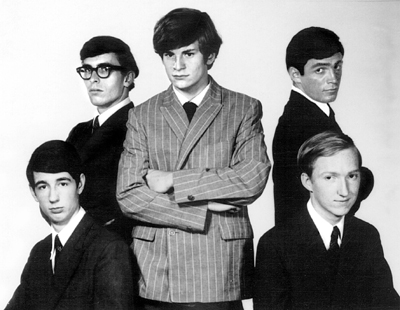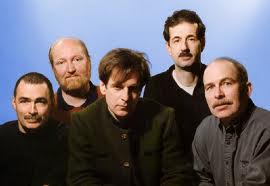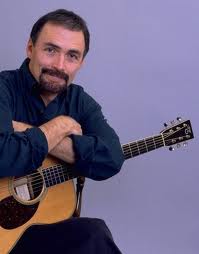Gary Talley of The Box Tops
“…the record started going up the charts. We were just dumbfounded.”

The Box Tops circa 1967: (l. to r.) Bill Cunningham, Danny Smythe, Alex Chilton, Gary Talley, John Evans
By phone from his home in Nashville
June 8, 1999
Not unknown but close to it, Gary Talley played guitar for The Box Tops, who had one of the indelible hits of the ‘60s, “The Letter.” And as a member of this Memphis band, he was an early (and again much later) colleague of Alex Chilton, one of rock and soul’s most mercurial characters.
I re-encountered Talley in the pages of “A Man Called Destruction,” a new biography of Chilton by Holly George-Warren. The book recalls an era – several, actually – but never manages to penetrate the late Chilton, who remains a mystery (probably just how he wanted to remain).
Talley comes across as a sane and steady counterweight to Chilton’s scattered genius. But then most everyone in “A Man Called Destruction” does (though not so Jody Stephens, Chilton’s creative foil in Big Star, his revered post-Box Tops band).
I spoke to Talley on the occasion of The Box Tops’ somewhat unlikely late ‘90s reunion tour – unlikely because Chilton seldom had nice things to say about his musical past. The group was touring in support of a recent CD, “Tear Off!,” the fifth Box Tops album and first since 1969, but it seemed to have a minuscule chance of success what with its release on a French label (Last Call) and its idiosyncratic, out-of-date song selection: mostly Memphis r&b and rockabilly, including a cover of “The Letter.” Of course I would have preferred to interview the long legendary Chilton, but he was not available and I gladly grabbed the chance to talk to Talley. He informed me that had stuck with music in the 25 some years since the demise of The Box Tops, working as a session player in Nashville, gigging occasionally with Sam Moore of Sam & Dave, and developing an approach to guitar teaching specifically geared to songwriters.
By the time The Box Tops arrived in Boston to play the Paradise on June 19, 1996, the circumstances of that particular show had changed drastically. The Box Tops had slipped from headliners to opening act for Juke Joint Jimmy and His Houseparty Rockers, actually the J. Geils Band warming up with a not-so-secret show in a hometown club before the official opening of their own reunion tour four days later. A fair number of staunch Box Tops fans were present and highly appreciative, but The Box Tops set, as terrific as it was, inevitably was overshadowed by the Geils Band’s first Boston performance in 17 years.
The original Box Tops (without keyboardist John Evans) would continue to tour regularly up until Chilton’s death at age 59 in 2010.
You have a new album [“Tear Off!] but it’s a French import. That might make it tough for fans to find.
It shouldn’t be hard to get, but I haven’t checked lately. We tried to work on that.
How did this reunion come about? Did you ever think it would happen?
No, I didn’t. It started when Bill Cunningham, the bass player, started calling people. And we said okay. I was surprised that Alex wanted to do it, mainly. It seemed like he didn’t have too much good to say about the old Box Top days. But he said, yeah, it would be fun. So we went into the studio to do that album and that was the first time we’d seen each other in thirty years basically. That was in ‘97. We hadn’t all seen each other since ‘67 because [drummer] Danny [Smythe] and [guitarist/keyboardist] John Evans quit at the end of ‘67. I had seen John since then, but I hadn’t seen Danny in literally thirty years. The other guys I’d run into every two or three years somewhere.
It was real crazy because we had no idea what we were going to do when we got there [Easley McCain Recording in Memphis]. Absolutely none. There was no pre-rehearsal or anything, no planning. We just went in there and said, “What do you want to do?” So we did songs that we used to know and that’s what wound up on the album, because they’re all songs that we liked and some of ‘em were just songs we always wanted to do. It took about three days and we got about six or seven songs. They sounded pretty good. We put a couple of overdubs on them and mixed them. Then we came back and did five or six more, so it was all done in two trips to Memphis. And most of the time was spent deciding what we were going to do. Everything on the album is either a first or second take, except “Big Bird” might be a third take. Everything is real spontaneous. We were rolling tape within thirty minutes of seeing each other for the first time in thirty years.
Was touring part of the plan from the start?
Actually we weren’t going to do any live dates. Then someone asked us about [playing] Memphis in May, which is always a pretty big deal and we said, well, okay. We hadn’t planned on doing much at all, but that went okay. Then a guy named Rick Levy, who I had met with Jay & the Techniques, wanted to book a few gigs and we said okay. We did the House of Blues in L.A., a private party for some big sports agent, a real life Jerry Maguire. [According to Holly George-Warren in “A Man Called Destruction,” this April, 1997 performance at the home of Barry Bonds’ manager was “disastrous.”] Then we did a few dates with the Kingsmen and that was a lot of fun. So we decided that we’d do it every year. So this is the third year that we’ve gotten together to do some live dates and it’s pretty fun.
Fill me in on what everyone has been doing when they’re not Box Tops.
Bill, he was a professional bassist for a really long time. Now he’s working for the International Trade Commission and lives outside of Washington DC in Fairfax, Virginia. John works for the University of Memphis doing something with computers, I’m not sure what it is. And Danny lives in Chicago. He’s a professional illustrator. And Alex live in New Orleans.
“The Letter” is of course your best known song. How’d you come to do it?
It was our first recording session. We had a manager who was a deejay, Roy Mack, and he wanted to cut some songs on us for regional distribution or to sell at gigs. We were called the DeVilles, the Box tops was a name our manager thought of. Wayne Carson, who wrote ”The Letter” – it says Wayne Carson Thompson on the record, but he goes by Wayne Carson – he was a writer from St. Joe, Missouri. He was in his late twenties and we were all teenagers. He had come to the studio before and wanted to get his songs demoed. He had four songs on a tape and “The Letter” was just the one we liked the best. We didn’t have a record deal, we were just doing a little demo. And Roy Mack was probably thinking if it sounds good we could release it regionally.
We were expecting [producer and American Sound Studios owner] Chips Moman to be there, but Dan Penn showed up instead and it was a good thing he did. Chips was a great producer, but Dan was just a totally unique guy. Then Larry Uttal from Bell Records came to the studio a few weeks after “The Letter” was cut. I think he came to hear something Chips had on Sandy Posey. She’d had a couple of hits and was on Bell Records. Larry Uttal heard the tape of “The Letter” and he just flipped. And all of a sudden we had a record deal. We were still playing as the DeVilles, but after the record was released we changed the name to The Box Tops when the record started going up the charts. We were just dumbfounded.
The story I’ve heard is that Chips didn’t like the airplane sounds that Dan Penn added to the record.
I wasn’t there but I’ve heard it from Dan Penn’s mouth. Chips said, “That would be okay if you’d just take that fucking airplane off there.” And Dan probably answered the same way. “I’ll cut this fucking tape to bits if you touch it.” I was just thrilled to have a record out there. When the record went to number one it was just totally mind blowing. We were just a bunch of teenagers in a band. We’d never played more than 150 miles outside Memphis. Gosh, it was just amazing. We couldn’t believe it. It was just a dream. Could this really be happening? We were so young, just teenagers. We could play, but none of us were really good musicians. We’d play on a bill with bands where the guys were much older, professional musicians, and we just felt so stupid. We were just a bunch of kids learning.
According to the liner notes of the “Best of” compilation [1996’s “Soul Deep: The Best of The Box Tops”], studio musicians took over and played on most of your sessions. Is that accurate?
That’s partly true. Sometimes they did that, sometimes they didn’t. There were recordings that the band played on, others that were all studio musicians, some that were both the band and studio musicians. It was a combination of different things.
Why did John and Danny leave the group? Why walk away from success?
I really was surprised when they wanted to leave. It was difficult. Touring was really grueling and we were on the road a lot. I was worn out, just exhausted most of the time. I guess that was a big factor for them too. Danny wanted to go back to college and get his art degree. I guess they figured it wasn’t going to last very long so it was better to go back to school. But I don’t know all the reasons they decided to quit. But I stayed in the band until Alex decided to quit and then I said, “I’m not going to be in the band without Alex because it’s going to be stupid.” We left in February, 1970, and that was the end of the real band. Our manager probably had every musician in Memphis out on the road as The Box Tops after that. And then there were some fake groups. We just put the worst one out of business. We had to file a lawsuit against this guy Lenny Longo who lives up in Pennsylvania somewhere and he’s had a fake group since ‘83. He had no connection with the records or the band at all, never even met us. It was just a screwy legal thing. Our manager Roy Mack told us he owned the name. On our checks it would say “Roy McElwaine, dba The Box Tops.” We thought he had the trademark and had the whole thing wrapped up, but he didn’t. So we had to go through a couple of years of lawsuits to get the name back.
Did you make good money from being a Box Top?
We were making good money for a 19-year-old kid. I thought I was rich. But it turned out that we weren’t getting nearly the money that we were supposed to. We were getting screwed there, but we didn’t know that until it was too late to do anything about it. We hired attorneys and ended up owing them money. We’ve recovered some of the royalty money since then. But it was pretty amazing to have just a few thousand dollars in the bank.
You got nominated for two Grammys in 1968 for “The Letter.” That must have been exciting. [The Box Tops were competing against the Beatles’ “Sgt. Pepper’s Lonely Hearts Club Band” in both categories, Contemporary Vocal Group and Group Vocal Performance – and lost both to the Fifth Dimension’s “Up, Up, and Away.”]
Yeah, we were right up there with the Beatles and Sam and Dave and Bobbie Gentry and all that. It’s amazing to look at the charts. What’s really odd is that I don’t remember being invited to the awards ceremony or anything. We were out on the road. I don’t think we even watched it on TV.
Alex has quite a reputation for unpredictable behavior. Has working with him been relatively smooth?
I don’t know. I don’t know what his best behavior is. How should I put it? He likes things done the way he likes things done. I won’t say he’s difficult, but if he has an opinion that differs from everybody else’s opinion, which is usually the case [laughs]….you kinda need to do what Alex wants to do most of the time. He is the lead singer and he’s the only guy who has any individual name recognition, so he’s in a different position than the rest of us. So we try to do whatever works for all of us. So it can be difficult sometimes, but nothing terrible.
Do you think you might make another record together?
We’ve got that in the back of our minds. Right now, we’re trying to get this record out there and let people know that it’s there. The release date was last November, but it still isn’t in a lot of stores. And we still haven’t gotten many reviews, so most people don’t know it’s out there.
The material on the record is mostly oldies, rockabilly and soul. Would you say it’s the roots of The Box Tops?
That’s it. Most of the songs are Memphis-related songs, either by Memphis artists or recorded in Memphis or things we actually played in the DeVilles before we were The Box Tops, like “Little Latin Lupe Lu.” I think that was the first song we did, because everybody knows that one. So everything has a Memphis connection. It’s what we were listening to when we were growing up.
It’s kind of like listening to [legendary Memphis deejay] Dewey Phillips, a wild mix with no color line.
Yeah, that’s a good analogy. Dewey Phillips was exactly like that. The album to me is a party album because we’re just having fun. We didn’t know we were going to make an album in there, it was a little experiment. In fact we agreed – we had it in writing – that if any one of us didn’t want to release it, we’d take the tape and burn it in the parking lot. I’m happy to say none of us wanted to do it.”

